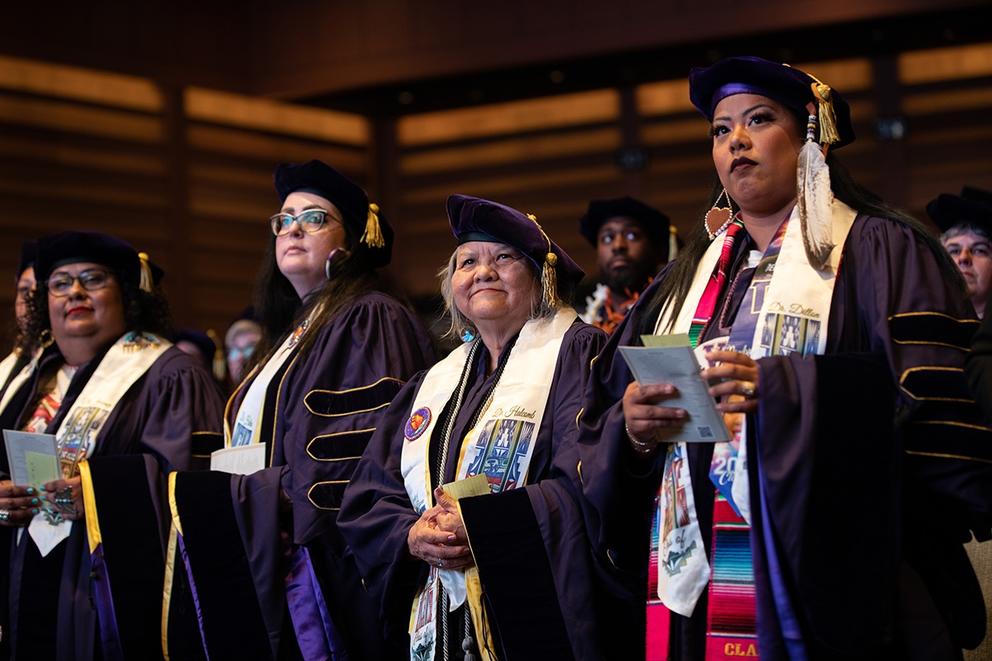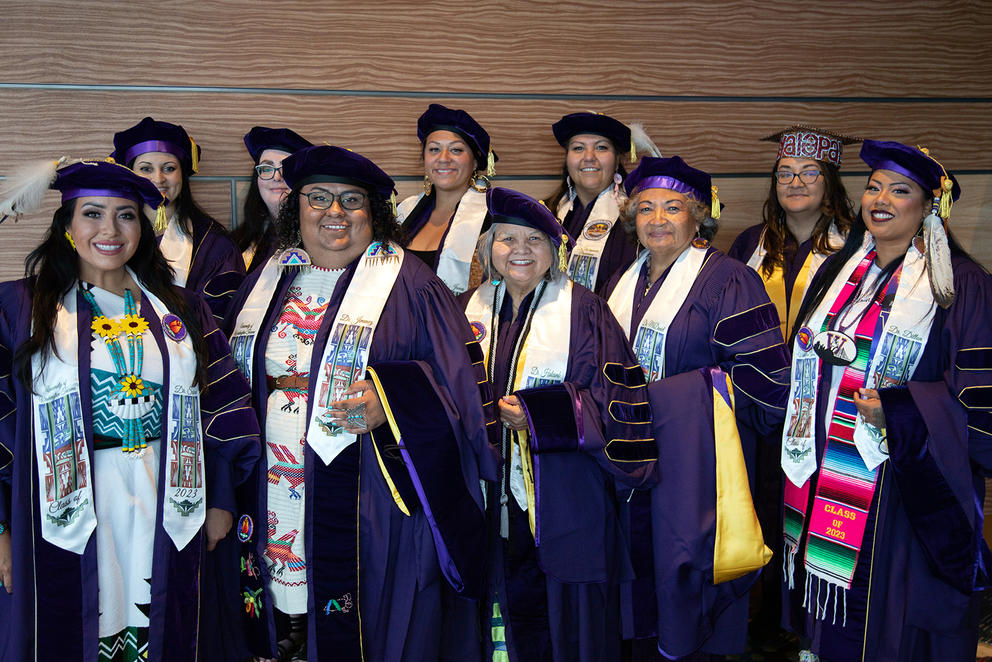This spring, Muckleshoot Tribal College and the University of Washington Tacoma graduated 10 doctoral students from the inaugural Muckleshoot Cohort, a first-of-its-kind educational leadership doctoral degree taught entirely by Indigenous faculty.
When the program started three years ago, this moment seemed like a far-fetched dream. Shortly after the program got a green light to launch, the COVID-19 pandemic threw its wrench. After just one in-person meeting, and even before filling the student roster, the program transitioned online.
The change required a quick transition from Dr. Bill, executive director of adult and higher education at Muckleshoot Tribal College, and Dr. Robin Starr Zape-tah-hol-ah Minthorn, Ph.D., professor and faculty director of educational leadership at the University of Washington Tacoma.
The pair quickly adapted, leading their students through a journey of remote learning. This spring they reached their goal of graduating all 10 of the program’s inaugural cohort. The group ranges in age and includes two great-grandmothers.
Three years later, the program is unlike any other offered at University of Washington Tacoma, and possibly the country. Dr. Bill says she hopes the Muckleshoot Cohort can serve as a template for other universities to follow.
“The difference in this program is that it’s taught by Indigenous professors that have worked with Native tribes, and using Native curriculum and books by Native authors or Indigenous authors. So that’s a totally different shift than any other program,” Dr. Bill said.
The Muckleshoot cohort graduated June 9, 2023. Front row, left to right: Joannie Suina, Eileen Jimenez, Mona Halcomb, Ada McDaniel, DeAnn Dillon. Back row, right to left: Jennifer Vasilez, Ronee K. Wapsock Pawwinnee, Merisa Jones, Debbie Hales and Amy Maharaj. (Courtesy of Dr. Robin Minthorn/University of Washington Tacoma)
Muckleshoot Cohort
UW Tacoma’s School of Education and the Muckleshoot Indian Tribe agreed in February 2020 to develop the Indigenous-based doctoral program in educational leadership over the next three years. The program uses Indigenous-centered curricula and approaches.
All courses are taught by Native American faculty and instructors, or by people who have worked closely with tribal communities. The goal is to equip Indigenous scholars with knowledge rooted in Indigenous ways of knowing.
Students choose a focus area, such as preschool to 12th grade, higher education, community and tribal education, or working in tribal departments within their communities, Dr. Minthorn says.
“Coming towards the end of the program, the students are now asserting themselves and their Indigeneity and who they are in their tribes,” Dr. Minthorn said. “Some have transitioned into other positions because of the program as well.”
After hundreds of years of assimilation and an education system intended to erase Indigenous peoples from history, the Muckleshoot Cohort celebrates Indigeneity.
“Finally, in this time period, we can reclaim education in our Native places, and in institutions that sometimes cannot be conducive to people of color,” Dr. Bill said.
Centering an Indigenous curriculum
Mona Halcomb, Umatilla, is the eldest student in the cohort. Now 68, she has been chasing her educational dreams since she started taking classes at Shoreline Community College in 1991.
“I always say I've spent my retirement funds earning this, and one of the reasons I did was because it's all Native faculty, focusing on Native education,” the great-grandmother said.
When creating this program, Dr. Bill, Dr. Minthorn and the other faculty knew it was imperative to have Indigenous educators leading the way, because they say it allows for Indigenous people to reclaim that part of their identity, while also exercising their inherent right to education.
“Sometimes people forget that education is a treaty right, just like fishing, hunting and gathering,” Dr. Bill said. “Education is one of our treaty rights and so, right now, it's really a great time that we're able to reclaim our education, and honor our ancestors and all the Native educational warriors.”
For some students, reframing their way of thinking was challenging at first. Halcomb, who has been pursuing higher education since 1991, earned both a bachelor’s and master’s degree. She says decolonizing her mind took some getting used to, but once she had that breakthrough, she was hooked.
“To get to a doctoral program that was Indigenized, it took me a moment to get accustomed to that, and comfortable. But now I'm all in,” she added with a chuckle.
For most Indigenous people, there is a complex relationship with Western education. For generations, getting an education meant leaving your family and being forced to assimilate – or suffer the consequences. It meant never speaking your language again, or practicing your traditions. And for many, it meant never coming home.
Ada McDaniel, a 63-year-old Muckleshoot grandmother with 21 grandchildren and her first great-grandchild on the way, says earning a doctorate was healing.
“I think we pursue doctorates to become healers,” McDaniel said. “We’re all healers, but some of us just have to prove it.”
For both McDaniel and Halcomb, getting to this point in time – where Indigenous identity and knowledge is celebrated and respected – is almost unbelievable.
“Both of my parents went to boarding school,” Halcomb said. “And when you just imagine that they were not allowed to speak their language, they were not allowed to practice [their culture] – to turn it around in my lifetime, just one generation later, where this program is encouraging you to utilize your language, your culture and earn your doctorate – it’s like, who would have thought?”
This article was originally published by Underscore News.




